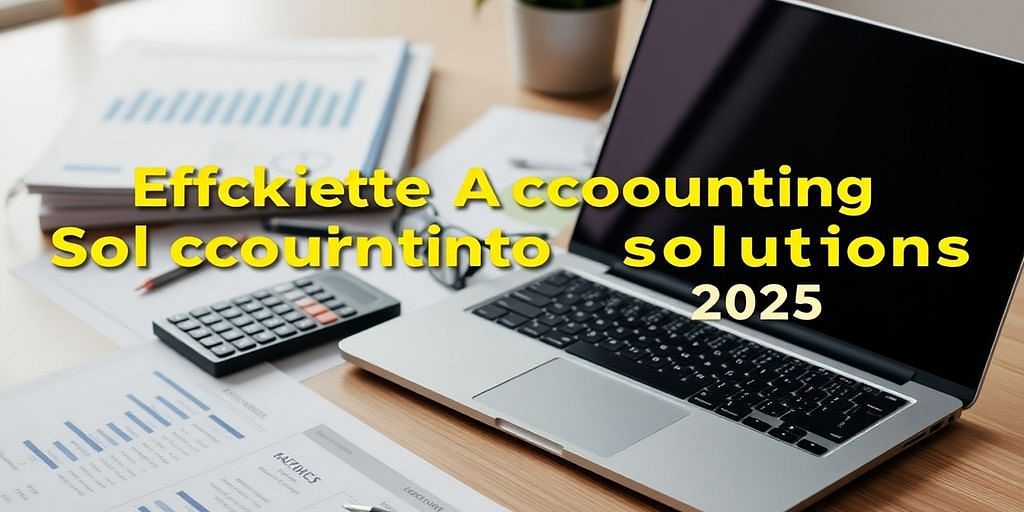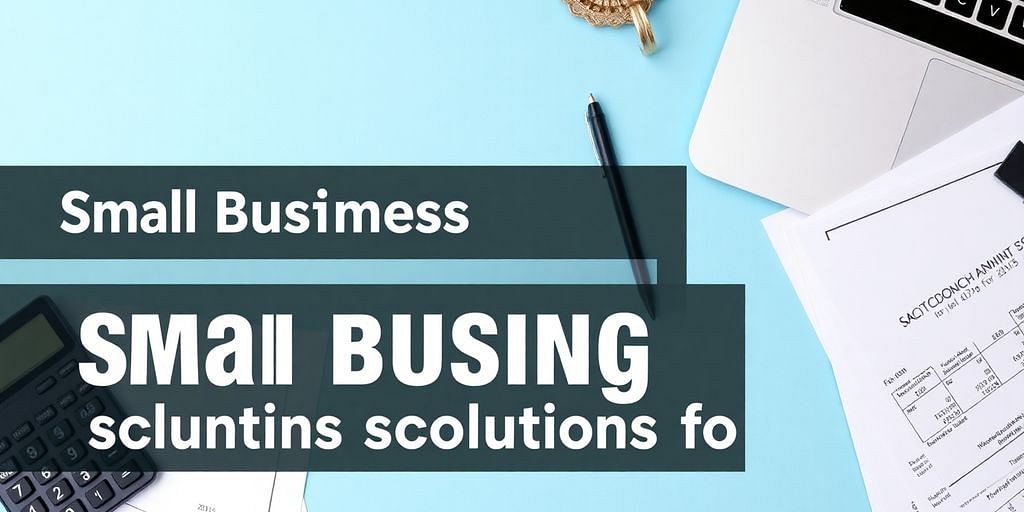
Unlocking Success: The Best Accounting Small Business Solutions for 2025
Back To BlogFinding The Right Fit For Your Business
Choosing accounting software can feel like a big decision, but it doesn't have to be overwhelming. We're here to help you break it down and find the perfect solution for your small business. It's all about understanding what you need and what's out there.
Understanding Your Unique Needs
First things first, let's get real about what your business actually needs. Don't just jump on the bandwagon with the latest trend; think about what will truly work for you. Do you need something that handles tax calculations, or are you more focused on expense tracking? Make a list of must-have features and those that are just nice-to-have. Trust us, this will save you a lot of headaches down the road.
- Solopreneurs or micro-businesses: Simple solutions might be enough.
- Small businesses with employees: More robust features are needed.
- Fast-growing startups: Scalable options are the way to go.
Evaluating Key Features
Good business finance software plays nice with others. Whether it's syncing with your bank or connecting to your favorite payroll app, seamless integration is key. This way, you can keep everything in one place without losing your mind. Also, consider these points:
- Look for scalability. Your business is going to grow, right? So, you want software that can grow with you.
- Read user reviews. Nothing beats real-world feedback. Check out reviews on platforms like Trustpilot or TrustRadius.
- Assess your business needs. This isn't about jumping on the latest trend but about finding what works for you.
The best software is the one that fits your specific needs and budget. Take your time to explore each option and consider what features are most important for your business operations. Remember, the right tool can save you time, reduce errors, and help you focus more on growing your business.
Budgeting For Your Accounting Solution
We all know how tight budgets can get, especially for small businesses. That's why affordable pricing is a big deal. Look for software that gives you the most bang for your buck without cutting corners. Some even offer flexible plans, so you only pay for what you need. Keep an eye out for deals and trials to make sure you're getting the best value on top accounting software.
- Affordable pricing plans are a must.
- Look for flexible plans, so you only pay for what you need.
- Consider free trials to test the waters.
Top Picks For Best Accounting Small Business Solutions

Okay, let's get into the nitty-gritty: which accounting software should you actually consider? We've looked at a bunch, and here are some that consistently come up as top contenders. Remember, the best choice really depends on your specific business, but these are solid starting points.
QuickBooks: The Crowd Favorite
It's no secret that QuickBooks is popular, and for good reason. It's been around for ages and has become a staple for many small businesses. It's like the reliable pickup truck of accounting software – not always the flashiest, but it gets the job done.
- Tons of features: invoicing, expense tracking, reporting, the works.
- Large user base: means lots of online support and tutorials.
- Integrates with pretty much everything.
QuickBooks can be a bit overwhelming at first because it has so many features. But once you get the hang of it, it's a powerful tool. They also have different versions, so you can scale as your business grows.
Xero: The User-Friendly Option
If you're looking for something a bit more modern and intuitive, Xero might be your pick. It's known for its clean interface and ease of use. Think of it as the sleek sports car of accounting software – stylish and efficient.
- Easy to navigate: even if you're not an accounting whiz.
- Good for collaboration: multiple users can access the same data.
- Mobile app: manage your finances on the go.
Xero's strength lies in its simplicity. It doesn't have quite as many features as QuickBooks, but it covers the essentials and does them well.
FreshBooks: Perfect For Freelancers
FreshBooks is tailored specifically for freelancers and self-employed individuals. It's all about making invoicing and time tracking as painless as possible. Imagine it as the perfectly organized toolbox for the solo entrepreneur.
- Invoice templates: create professional-looking invoices in minutes.
- Time tracking: keep track of your billable hours.
- Project management: manage projects and track expenses.
FreshBooks really shines when it comes to client management. It's designed to help you stay organized and get paid faster. It might not be the best choice for larger businesses with complex accounting needs, but for freelancers, it's a winner.
Maximizing The Benefits Of Accounting Software
Okay, so you've picked out your accounting software. Awesome! But now what? It's not just about having the tools; it's about using them to their full potential. Let's talk about how we can really make this software work for us.
Streamlining Your Financial Processes
Think of your accounting software as a super-efficient assistant. It can automate a ton of stuff that used to take forever. We're talking about things like invoicing, tracking expenses, and reconciling bank accounts. This not only saves us time but also reduces the chance of errors. Imagine all the things we can do with that extra time – like actually growing our businesses! top accounting software can really change the game.
Gaining Real-Time Insights
One of the coolest things about modern accounting software is that it gives us real-time visibility into our finances. No more waiting until the end of the month to see how we're doing. We can see exactly where our money is going, what's selling well, and where we might need to cut back. This kind of insight is invaluable for making smart decisions. It's like having a financial dashboard right at our fingertips. We can easily monitor key metrics such as revenue, expenses, and cash flow. This helps us understand our company's financial health and performance better.
Improving Decision-Making
With all this data at our disposal, we can make much better decisions about the future of our businesses. We can spot trends, identify opportunities, and anticipate problems before they arise. It's like having a crystal ball, but instead of magic, it's just good, solid data. Plus, it helps us stay compliant with tax regulations and financial reporting standards. This is crucial for avoiding penalties and legal issues. accounting software helps us maintain compliance by automatically calculating taxes and generating accurate financial statements.
Implementing new accounting software is a big deal. It needs careful planning, clear communication, and ongoing support. By following some simple tips, we can make the transition smoother and really get the most out of our new system.
Tips For A Smooth Transition To New Software

Switching to new accounting software can feel like a big step, but with the right approach, it doesn't have to be a headache. We've all been there – staring at a screen, wondering if we're about to mess everything up. But trust us, with a little planning, you can make the move without losing your mind (or your data!).
Data Migration Made Easy
First things first: your data. This is the most important part of the whole process. Before you even think about touching the new software, take a good, hard look at what you've got. Think of it like decluttering your closet before moving to a new house.
- Audit your current data. What's important? What can you leave behind?
- Create a mapping plan. Figure out how your old data fields translate to the new system. This will help you with planning key dates.
- Back it all up! Seriously, back it up. More than once. You'll thank us later.
Data migration isn't just about moving numbers; it's about preserving the history of your business. Treat it with the respect it deserves, and you'll avoid a lot of headaches down the road.
Training Your Team
Okay, you've got your data sorted. Now it's time to get your team on board. No one likes being thrown into the deep end without a life jacket, so make sure everyone gets the training they need.
- Identify your superusers. These are the people who will become the go-to experts.
- Develop a training program. Hands-on workshops are great, but even short, regular sessions can make a big difference.
- Offer ongoing support. Be patient, answer questions, and create a safe space for people to learn.
Setting Up For Success
Almost there! Now it's time to configure the new software to fit your business like a glove. This means setting up your chart of accounts, customizing forms, and integrating with other systems.
- Review your chart of accounts. Make sure it's optimized for the new software.
- Customize forms and reports. Tailor them to your specific needs.
- Set up integrations. Connect your accounting software with your other business tools to import data and reduce manual entry.
Switching to new software can be tricky, but it doesn't have to be! Start by getting everyone on your team involved in the process. Make sure to provide training and support to help them adjust. Also, take your time to explore the new features and tools. For more helpful tips and resources, visit our website today!
Frequently Asked Questions
What is accounting software for small businesses?
Accounting software for small businesses is a tool that helps manage financial tasks easily. It can automate jobs like tracking money coming in and going out, making invoices, and preparing reports to show how the business is doing financially.
Why do I need accounting software for my small business?
Using accounting software can save you time and reduce mistakes. It helps you keep your finances organized, gives you a clear picture of your financial health, and allows you to focus more on growing your business instead of getting lost in numbers.
How do I choose the right accounting software for my business?
To pick the best accounting software, think about what your business needs. Look for features like easy invoicing, expense tracking, and good customer support. Also, consider your budget and whether the software can grow with your business.
